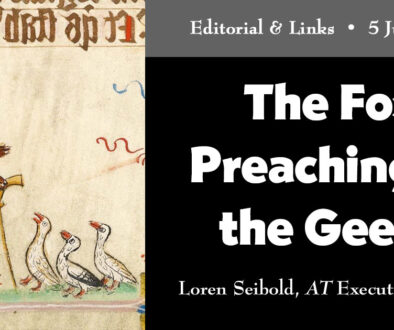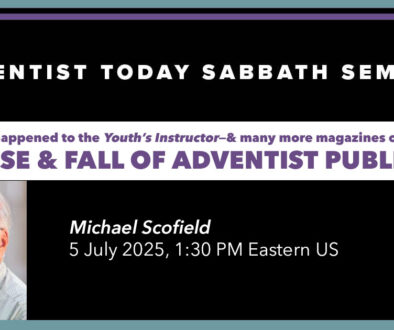Seasons of the Soul in the Psalms
10 November 2021 |
Our Adventist Today Sabbath Seminar concerns an aspect of Christian spirituality and worship and its implications for Adventism. Our focus will be on the Psalms, the Old Testament book of worship and praise par excellence. These psalms also permeate the New Testament, which quotes and alludes to them more than one hundred times. Even Satan (mis)quotes the Psalms (Ps 91:11–12 in Luke 4:10–11). Thus, the Psalms were important not only for Israel in its corporate worship but also for the early church in its preaching of the gospel.
However, the use of the Psalms in contemporary Christianity is highly selective. We hear a great deal about a select few such as, “The LORD is my shepherd, I shall not want” (Ps 23); “O LORD, our Sovereign, how majestic is your name in all the earth” (Ps 8); “Praise him for his mighty deeds; praise him according to his surpassing greatness” (Ps 150), etc. While in corporate worship and personal devotion we occasionally use psalms to express our remorse for sin, e.g., “Have mercy on me, O God, according to your steadfast love” (Ps 51), such psalms of contrition are made the basis for thanking God for his wonderful mercy and forgiveness. Such use of the Psalms is lopsided, resulting in a style of worship that is almost entirely focused on acknowledging God’s greatness. This does not do justice to the variety of psalms used by Israel.
But it gets worse. To illustrate how far contemporary Christian and Adventist practice deviates from the worship of Israel reflected in the Psalms, it is helpful to note the different types of psalms on display.
There have been many attempts to categorize the different types of psalms. In my opinion, one of the most helpful schemes is that suggested by Walter Brueggemann, who sets out three broad interactions between psalmists and God. First, there are psalms of “orientation”. These psalms offer foundational affirmations of faith that sketch a general orientation for the life of the believer. Here, God is the creator, redeemer, strong tower, loving parent, etc. For example, Ps 46:
1 God is our refuge and strength,
a very present help in trouble.
2 Therefore we will not fear, though the earth should change,
though the mountains shake in the heart of the sea;
3 though its waters roar and foam,
though the mountains tremble with its tumult.
4 There is a river whose streams make glad the city of God,
the holy habitation of the Most High.
5 God is in the midst of the city; it shall not be moved;
God will help it when the morning dawns.
6 The nations are in an uproar, the kingdoms totter;
he utters his voice, the earth melts.
7 The LORD of hosts is with us;
the God of Jacob is our refuge.
8 Come, behold the works of the LORD;
see what desolations he has brought on the earth.
9 He makes wars cease to the end of the earth;
he breaks the bow, and shatters the spear;
he burns the shields with fire.
10 “Be still, and know that I am God!
I am exalted among the nations,
I am exalted in the earth.”
11 The LORD of hosts is with us;
the God of Jacob is our refuge.
Psalms like this arise from periods in the life of believers when all is well. In times when we thank God for giving us a fulfilling life, for family members who love us, pastors who nurture us, friends who care for us.
However, we do not live constantly in the season of “orientation”. Periodically, we enter the dark night of the soul. It is here that the psalms of “disorientation” arise, amid problems that disorient us, when reality challenges our certainty. Times when God seems distant and uncaring. For example, Ps 44:
9 You have rejected us and abased us,
and have not gone out with our armies.
10 You made us turn back from the foe,
and our enemies have gotten spoil.
11 You have made us like sheep for slaughter,
and have scattered us among the nations.
12 You have sold your people for a trifle,
demanding no high price for them.…
17 All this has come upon us,
yet we have not forgotten you,
or been false to your covenant.
18 Our heart has not turned back,
nor have our steps departed from your way,
19 yet you have broken us in the haunt of jackals,
and covered us with deep darkness.…
23 Rouse yourself! Why do you sleep, O Lord?
Awake, do not cast us off forever!
24 Why do you hide your face?
Why do you forget our affliction and oppression?
25 For we sink down to the dust;
our bodies cling to the ground.
26 Rise up, come to our help.
Redeem us for the sake of your steadfast love.
Notice the strength of the emotional and accusatory language in this psalm. Yet believers emerge from such dark and troubling times. When they do, they sing the psalms of “reorientation”. Now, questions have been answered; doubts resolved; and God once again is close and caring. These are psalms sung once the season of “disorientation” has passed. The dynamics of this spiritual movement is illustrated in Ps 30:
Original orientation
6 As for me, I said in my prosperity,
“I shall never be moved.”
7a By your favor, O LORD,
you had established me as a strong mountain;
Disorientation
7b you hid your face;
I was dismayed.
8 To you, O LORD, I cried,
and to the LORD I made supplication:
9 “What profit is there in my death,
if I go down to the Pit?
Will the dust praise you?
Will it tell of your faithfulness?
10 Hear, O LORD, and be gracious to me!
O LORD, be my helper!”
Reorientation
11 You have turned my mourning into dancing;
you have taken off my sackcloth
and clothed me with joy,
12 so that my soul may praise you and not be silent.
O LORD my God, I will give thanks to you forever.
Taken as a whole, therefore, the Psalms outline the seasons of the soul. The journey taken by believers as they move through the seasons of orientation, disorientation, and reorientation. These movements are integral to the spirituality of the Psalms and form the bedrock of biblical public worship. Yet, I suggest, contemporary Christian worship, whether Adventist or not, has transformed the honesty and transparency of biblical worship into one-dimensional unquestioning praise, by censoring the psalms of disorientation.
In the Adventist Today Sabbath Seminar we will explore the possible reasons for this banishing of disorientation from our worship and consider its impact on our individual spirituality and corporate church life.
Guest teacher:
Laurence Turner is Principal Lecturer Emeritus in Old Testament at Newbold College of Higher Education.
Moderator:
Raj Attiken is a retired president of the Ohio Conference, now an adjunct professor at Kettering College.
How to join:
This event is over. You can watch the presentation here.
When:
ATSS starting time depends on where you are. If you’re on the west coast of the United States, it’ll be 10:30 AM. On the east coast, 1:30 PM.
Times around the world:
-
- Reykjavík: 5:30 PM
- College Place: 10:30 AM
- Lincoln: 12:30 PM
- Denver: 11:30 AM
- Bracknell: 6:30 PM
- Loma Linda: 10:30 AM
- Nairobi: 8:30 PM
- Gackle: 12:30 PM
- Hosur: 11:00 PM
- Waco: 12:30 PM
- Tulsa: 12:30 PM
- Helsinki: 8:30 PM
- Stockholm: 7:30 PM
- Hamburg: 7:30 PM
- Cape Town: 7:30 PM
- Madrid: 7:30 PM
- Paris: 7:30 PM
- Honolulu: 7:30 AM
- Cooranbong: 4:30 AM (Sunday)
- Perth: 1:30 AM (Sunday)
The class is intended to last about 2 hours, though the conversation often continues to 4 PM.
About our class:
- The AT Sabbath Seminar is intended to be a courteous forum. We discuss and ask questions politely. We don’t accuse, get angry, or put people down.
- Stick to the topic in both comments and chat discussion.
- Make your comments and questions short—don’t dominate.
- Keep your microphones muted unless you are called upon to make your comment or ask your question.
- Indicate your interest in speaking by raising your electronic hand—under the “reactions” button.
- Please use your name when you sign in! Not your phone number, not your initials. This will help us differentiate you from unwelcome guests who want to disrupt us. You can set your name after signing on by clicking on the 3 dots next to your picture, which drops down a menu.
- If it should happen that we are attacked so that we have to stop the meeting, we’ll quickly post a new meeting link on our AT Facebook page.
We look forward to getting acquainted with you!
Coming up:
- November 20 – Todd Leonard
- December: Denis Fortin on Ecumenism
- Stanley Patterson




